Knowing
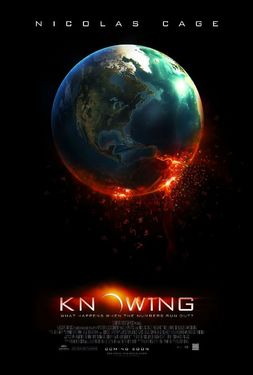
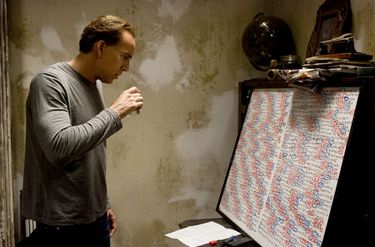 In a prologue sequence set in 1959, we see a little girl named Lucinda Embry (Lara Robinson) put a piece of paper that is covered top to bottom with seemingly random numbers in a school time capsule. The girl is solemn and withdrawn from the other students, and hears ghostly whispers all the time, so she obviously knows of some ominous event that's to occur. Flash forward to the present, when the time capsule is unearthed, and the piece of paper Lucinda placed inside it falls into the hands of a widower college professor named John Koestler (Nicolas Cage) and his young son Caleb (Chandler Canterbury). With a level of speed and deduction that would make Sherlock Holmes jealous, John figures out that the numbers are not random at all, but they are rather a list of every major disaster that was yet to happen at the time Lucinda scribbled them down, as well as the number of casualties in each event. John quickly discovers that there are dates yet to come on the list, and begins to wonder if there's a way he can prevent the future disasters from occurring. But who are the mysterious people dressed in black who lurk in the woods surrounding John's home, and why is Caleb suddenly starting to hear the same constant whispering that Lucinda did in the opening sequence?
In a prologue sequence set in 1959, we see a little girl named Lucinda Embry (Lara Robinson) put a piece of paper that is covered top to bottom with seemingly random numbers in a school time capsule. The girl is solemn and withdrawn from the other students, and hears ghostly whispers all the time, so she obviously knows of some ominous event that's to occur. Flash forward to the present, when the time capsule is unearthed, and the piece of paper Lucinda placed inside it falls into the hands of a widower college professor named John Koestler (Nicolas Cage) and his young son Caleb (Chandler Canterbury). With a level of speed and deduction that would make Sherlock Holmes jealous, John figures out that the numbers are not random at all, but they are rather a list of every major disaster that was yet to happen at the time Lucinda scribbled them down, as well as the number of casualties in each event. John quickly discovers that there are dates yet to come on the list, and begins to wonder if there's a way he can prevent the future disasters from occurring. But who are the mysterious people dressed in black who lurk in the woods surrounding John's home, and why is Caleb suddenly starting to hear the same constant whispering that Lucinda did in the opening sequence?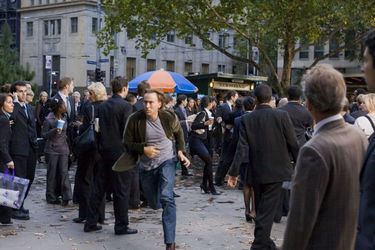 I'm afraid that is only the tip of the iceberg when it comes to the plot, which is one of the big problems in Knowing. There's a lot of ideas on display here, but nowhere near enough time to fit them all in. The movie wants to be a doomsday story, a movie about a man struggling with his religious faith, a disaster flick, a drama about a dysfunctional family who refuses to come together, an ecological warning, and a race against time as John and Caleb are joined by a woman named Diana Wayland (Rose Byrne) and her young daughter Abby (Lara Robinson again) as they try to figure out how to stay alive from the ultimate disaster the list hints at. We get all this, and aliens too, who are visiting Earth looking for the "chosen ones". If this all sounds somewhat silly and bombastic, you don't know the half of it. The movie is an assault on the senses, and not in a good way. The movie bombards us with one disaster after another, while the heavy-handed music score by Marco Beltrami blasts and pounds away at our skulls and eardrums as it tries to build tension. It got to the point that I was grateful when a relatively quiet scene came up on the screen.
I'm afraid that is only the tip of the iceberg when it comes to the plot, which is one of the big problems in Knowing. There's a lot of ideas on display here, but nowhere near enough time to fit them all in. The movie wants to be a doomsday story, a movie about a man struggling with his religious faith, a disaster flick, a drama about a dysfunctional family who refuses to come together, an ecological warning, and a race against time as John and Caleb are joined by a woman named Diana Wayland (Rose Byrne) and her young daughter Abby (Lara Robinson again) as they try to figure out how to stay alive from the ultimate disaster the list hints at. We get all this, and aliens too, who are visiting Earth looking for the "chosen ones". If this all sounds somewhat silly and bombastic, you don't know the half of it. The movie is an assault on the senses, and not in a good way. The movie bombards us with one disaster after another, while the heavy-handed music score by Marco Beltrami blasts and pounds away at our skulls and eardrums as it tries to build tension. It got to the point that I was grateful when a relatively quiet scene came up on the screen.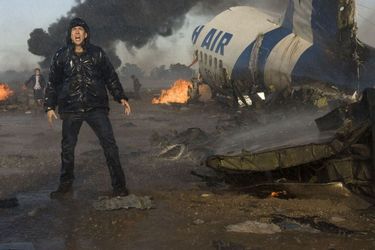 The movie actually starts out quiet and somewhat intelligent. It seems to ask a lot of questions, like are the tragic events that happen to us planned, or is it simply a case of "shit happening", as the character of John so elegantly puts it. True, Nicolas Cage doesn't exactly do anything great with his performance (he's pretty much cashing a paycheck here, something he's been doing with disturbing frequency), but we buy into it, because it all seems to be leading up to something. This is a story that would have benefitted from a screenplay that was actually interested in exploring its own ideas. Instead, we get a lot of violent disaster set pieces that are shot quite well (there are no cuts during a sequence when John witnesses a plane crash near a highway where he's stuck in traffic, and goes running to help the few survivors), but quickly grow increasingly silly. It all leads up to an endless string of scenes where the actors are required to do nothing but run around, screaming at each other, until the climactic moments, which manage to be tragically depressing and upliftingly hoaky at the same time.
The movie actually starts out quiet and somewhat intelligent. It seems to ask a lot of questions, like are the tragic events that happen to us planned, or is it simply a case of "shit happening", as the character of John so elegantly puts it. True, Nicolas Cage doesn't exactly do anything great with his performance (he's pretty much cashing a paycheck here, something he's been doing with disturbing frequency), but we buy into it, because it all seems to be leading up to something. This is a story that would have benefitted from a screenplay that was actually interested in exploring its own ideas. Instead, we get a lot of violent disaster set pieces that are shot quite well (there are no cuts during a sequence when John witnesses a plane crash near a highway where he's stuck in traffic, and goes running to help the few survivors), but quickly grow increasingly silly. It all leads up to an endless string of scenes where the actors are required to do nothing but run around, screaming at each other, until the climactic moments, which manage to be tragically depressing and upliftingly hoaky at the same time.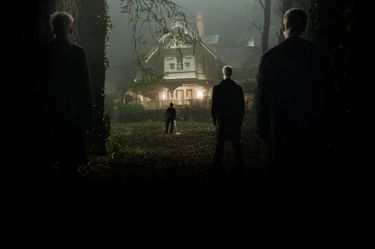 Knowing ends up being undone by its own sense of spectacle, and it's "everything but the kitchen sink" mentality. A story such as this needs a tight focus, but here it careens wildly about from Roland Emmerich-inspired disaster flick to Spielberg-style sci-fi fantasy. I may have eventually felt exhausted while watching it, but I was certainly never bored. As I mentioned, there is definitely a certain style to admire here. Proyas manages some very impressive shots that must have been hard to set up. And yet, even he manages to get carried away as the story descends into madness. A sequence where a subway train flies off the rails into a crowd of waiting people starts out being impressive and tragic, but then we get a first person point of view shot through the train's windshield as it mows down the people, CG blood splattering on the screen. What could have been technically impressive turns into something that's cheap and exploitive.
Knowing ends up being undone by its own sense of spectacle, and it's "everything but the kitchen sink" mentality. A story such as this needs a tight focus, but here it careens wildly about from Roland Emmerich-inspired disaster flick to Spielberg-style sci-fi fantasy. I may have eventually felt exhausted while watching it, but I was certainly never bored. As I mentioned, there is definitely a certain style to admire here. Proyas manages some very impressive shots that must have been hard to set up. And yet, even he manages to get carried away as the story descends into madness. A sequence where a subway train flies off the rails into a crowd of waiting people starts out being impressive and tragic, but then we get a first person point of view shot through the train's windshield as it mows down the people, CG blood splattering on the screen. What could have been technically impressive turns into something that's cheap and exploitive.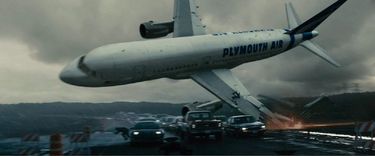
See the movie times in your area or buy the DVD at Amazon.com!






0 Comments:
Post a Comment
<< Home